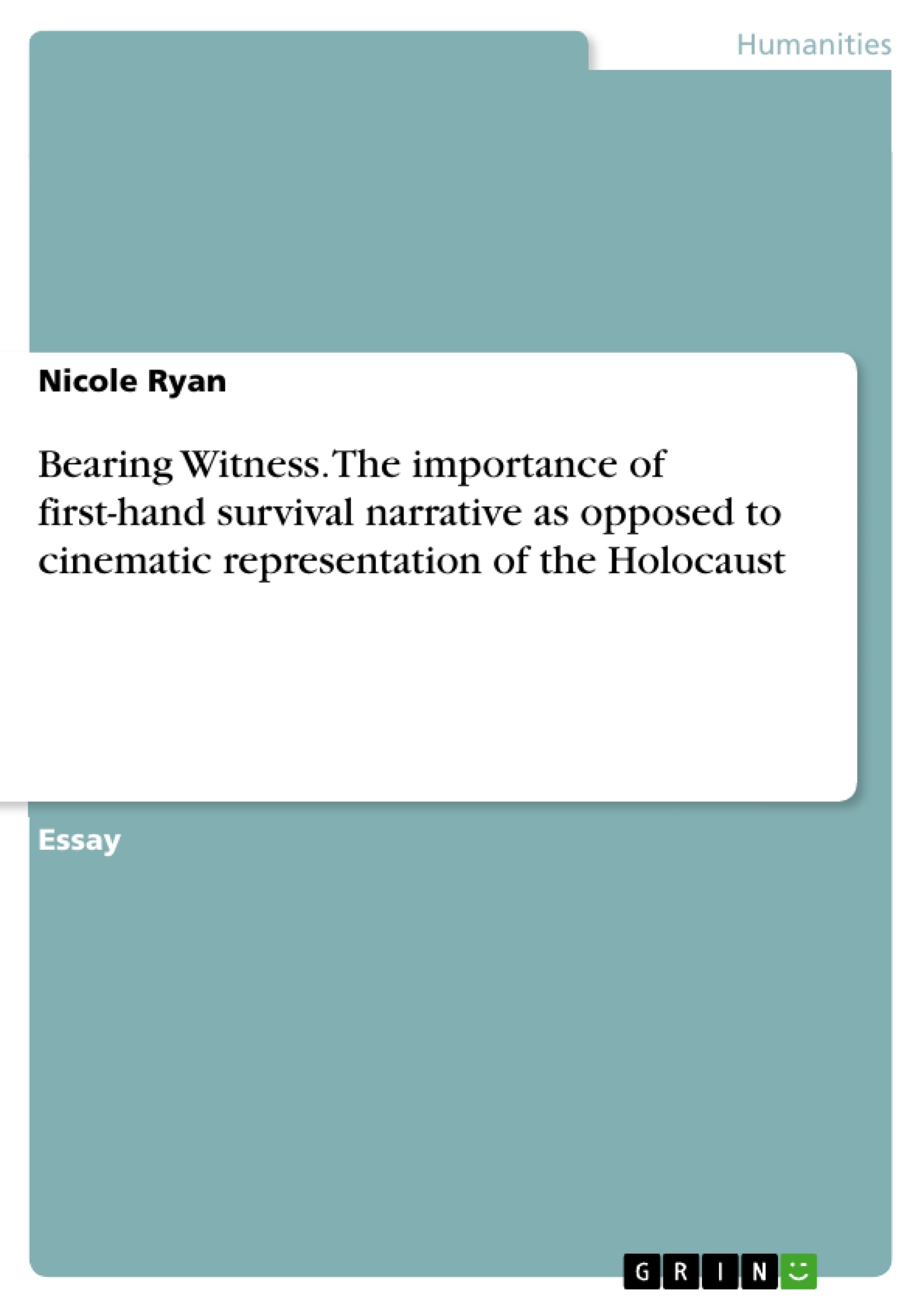This essay argues that the best, most authentic way of educating future generations about the Holocaust is through personal narrative. Testimonies such as those made by Frances Flumenbaum, and the others on the Shoah Foundation site, and Vladek’s testimony through "Maus", are successful at informing and educating without any exploitation.
It is through these narratives that we learn the most. We see the faces of the survivors, we hear them choke back tears with shaky voices as they speak of heir parents and siblings and friends who were lost. Their survival forces society to always remember, and to learn from the past. It is the most important that the survivor testimonies are preserved forever. We could lose all of the films, the history books, and the fictional novels, but to lose the survivor testimony, that would genuinely be the greatest loss of all.
Inhaltsverzeichnis (Table of Contents)
- Bearing Witness
- First-Hand Testimony
- Frances Flumenbaum
- Inherited Holocaust Memory and the Ethics of Ventriloquism
- Lori Hope Lefkovitz
- Art Spiegelman's MAUS
- Arlene Fish Wilner
- Uwe Boll's Auschwitz
Zielsetzung und Themenschwerpunkte (Objectives and Key Themes)
This essay examines the significance of first-hand survival narratives in conveying the Holocaust experience, comparing them to cinematic representations. The author argues that while first-hand testimonies provide a powerful and unfiltered account of the horrors, cinematic depictions can be problematic due to potential exploitation and the difficulty of accurately portraying such traumatic events.
- The importance of first-hand survival narratives in preserving Holocaust memory
- The complexities of translating Holocaust experiences into narratives
- The ethical dilemmas of cinematic representations of the Holocaust
- The role of guilt and responsibility in recounting Holocaust stories
- The potential for exploitation and the need for sensitivity in depicting the Holocaust
Zusammenfassung der Kapitel (Chapter Summaries)
- Bearing Witness: This introductory section sets the stage for the essay by discussing the inherent human desire to tell stories, particularly in the context of the Holocaust. The author emphasizes the importance of first-hand survivor narratives in educating future generations about the atrocities committed by the Nazis.
- First-Hand Testimony: This section focuses on the power of first-hand testimonies as a means of preserving and transmitting Holocaust memory. The author analyzes the testimony of Frances Flumenbaum, a Polish Jew who survived the Holocaust. Flumenbaum's narrative highlights the horrors of the camps and emphasizes the importance of remembrance and learning from history.
- Inherited Holocaust Memory and the Ethics of Ventriloquism: This section delves into the complexities of Holocaust narratives, particularly the challenges faced by survivors in recounting their experiences. The author discusses the article by Lori Hope Lefkovitz, who examines the struggles of her father, a Holocaust survivor, to articulate his experiences. Lefkovitz's analysis emphasizes the difficulty of accurately conveying the profound trauma of the Holocaust.
- Art Spiegelman's MAUS: This section analyzes Art Spiegelman's graphic novel MAUS, exploring how he navigates the ethical challenges of using his father's story. The author discusses how Spiegelman uses the comic book form to connect future generations to the past without exploiting the Holocaust. The section also explores the theme of guilt in relation to profiting from Holocaust narratives.
- Uwe Boll's Auschwitz: This section examines the controversial film "Auschwitz" by Uwe Boll, criticizing its graphic and potentially exploitative depiction of the death camp. The author argues that Boll's film raises questions about the ethics of representing such sensitive historical events and the need for authenticity and sensitivity in filmmaking.
Schlüsselwörter (Keywords)
This essay explores the key concepts of first-hand testimony, Holocaust memory, ethical representation, cinematic depictions, exploitation, guilt, and the importance of remembrance and education in preserving the memory of the Holocaust.
- Arbeit zitieren
- Nicole Ryan (Autor:in), 2016, Bearing Witness. The importance of first-hand survival narrative as opposed to cinematic representation of the Holocaust, München, GRIN Verlag, https://www.hausarbeiten.de/document/318443


